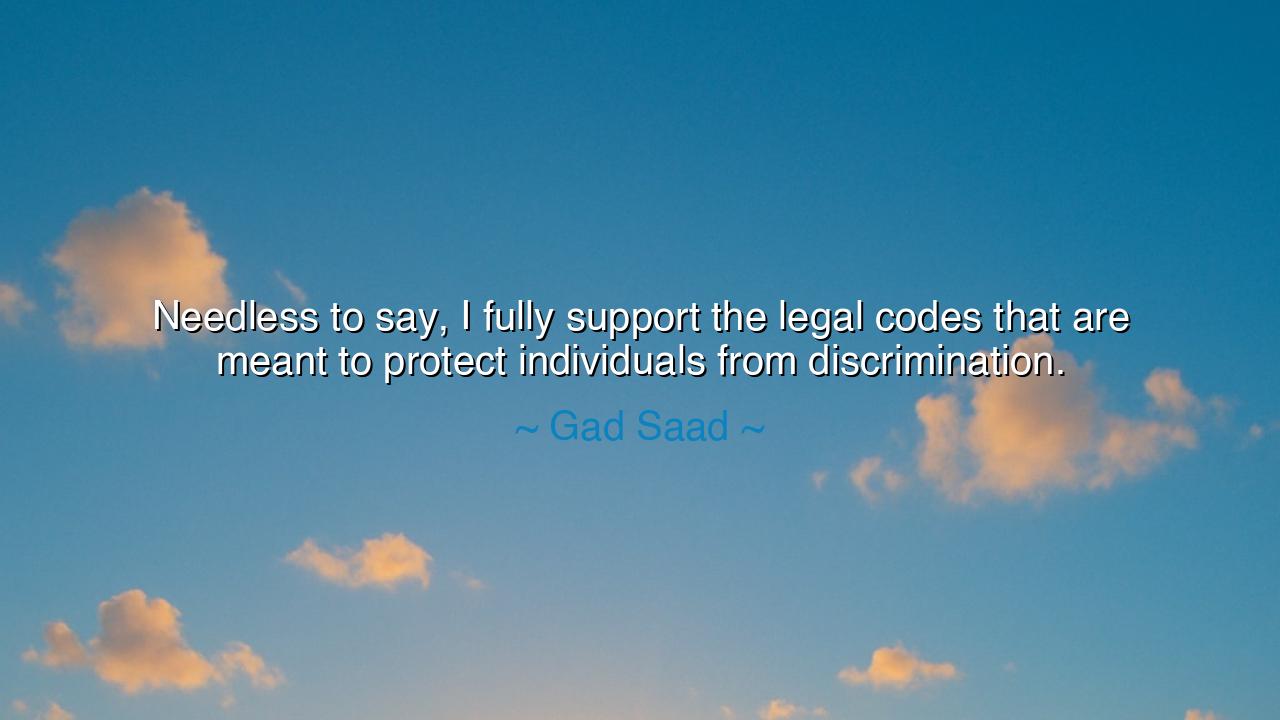
Needless to say, I fully support the legal codes that are meant
Needless to say, I fully support the legal codes that are meant to protect individuals from discrimination.






"Needless to say, I fully support the legal codes that are meant to protect individuals from discrimination." Thus spoke Gad Saad, scholar and voice of reason, affirming a truth so essential that he prefaces it with the phrase "needless to say." Yet even truths that seem self-evident must be spoken aloud, for memory is short and injustice is persistent. His words carry not only support for legal codes, but also reverence for the deeper principle behind them: that every human being, regardless of origin, faith, or station, deserves to live free from discrimination.
The origin of this wisdom lies in the long, bloody history of humanity’s struggles against injustice. From ancient times, societies have divided themselves by tribe, caste, class, or color. Each division birthed oppression, and each oppression eventually summoned its own resistance. In the modern world, the fruits of these struggles are found in laws—written codes meant to restrain the cruelty of prejudice. Saad’s words honor these laws not as abstractions, but as shields forged in the fire of history, protecting the dignity of individuals who would otherwise be crushed by the weight of hatred.
Consider the story of Martin Luther King Jr. and the civil rights movement in the United States. For centuries, Black Americans endured discrimination enshrined in law. Segregation was not just social practice—it was written, defended, and enforced by legal systems. Only through tireless struggle did new legal codes emerge: the Civil Rights Act, the Voting Rights Act, and others that began to dismantle legalized oppression. These were not perfect, but they were monumental. They stand as proof that when societies enshrine protection in law, they affirm the equal humanity of all. Saad’s statement reflects this heritage, acknowledging the power of such laws to guard against the abyss of injustice.
Yet his words also hint at a warning. For though he supports the codes, Saad often critiques the misuse of them when they are twisted into tools for censorship or political gain. His affirmation reminds us of the delicate balance: laws against discrimination are sacred, but they must remain true to their purpose—protecting individuals from harm, not manufacturing new forms of division. Thus his words are both endorsement and caution: support what is just, but guard against distortion.
This is not only a legal matter, but a profoundly moral one. To oppose discrimination is to recognize the shared spark of humanity in every person. To protect the vulnerable is to strengthen the whole. A society that neglects such protections corrodes its own foundation, for injustice toward one group eventually poisons all. The law, when rooted in justice, is not merely a system of rules but a covenant between the powerful and the powerless, a promise that dignity is not a privilege but a right.
The lesson for us is clear: do not take these legal codes for granted. They were won through generations of sacrifice, struggle, and suffering. Do not allow them to be weakened, ignored, or twisted. Defend them, not only in courts, but in your daily life, by refusing to tolerate discrimination in speech, action, or silence. Let the law inspire the heart, and let the heart sustain the law.
What practical steps must we take? Support policies that uphold equal protection for all. Stand alongside those who suffer prejudice, for silence is complicity. Teach the young the history of discrimination, so that they may understand why these codes exist and why they must endure. And above all, live with integrity: treat each person with fairness, for laws are only strong when they reflect the values embodied in daily life.
So let Saad’s words be carried forward: needless to say, justice must always defend against discrimination. It may seem obvious, but it is a truth that must be spoken again and again, lest it be forgotten. For when the law protects the dignity of all, society flourishes; when it fails, oppression festers. Remember this, teach this, live this—and the covenant of justice will endure for generations yet to come.






AAdministratorAdministrator
Welcome, honored guests. Please leave a comment, we will respond soon